Stock Market Breaks Down, Financial Regulation Too Little Too Late
Stock-Markets / Financial Markets 2010 May 22, 2010 - 04:52 AM GMT The U.S. Senate, bringing Congress to the brink of passing the most comprehensive regulation of the financial industry since the Great Depression, approved a bill that imposes restrictions on proprietary trading by banks and creates a consumer protection agency designed to prevent lending abuses that triggered the housing collapse and the worst unemployment in almost three decades.
The U.S. Senate, bringing Congress to the brink of passing the most comprehensive regulation of the financial industry since the Great Depression, approved a bill that imposes restrictions on proprietary trading by banks and creates a consumer protection agency designed to prevent lending abuses that triggered the housing collapse and the worst unemployment in almost three decades.
The legislation, approved by a 59-39 vote yesterday and requiring reconciliation with a bill passed by the House of Representatives in December, provides a mechanism for liquidating financial institutions, until recently considered too big to fail, a council of regulators monitoring threats to the economy and specific restraints on the trading of so-called derivatives, which spawned the toxic debts that seized up the credit markets in 2007 and 2008 and prompted the Federal Reserve to make trillions of dollars of loans to banks on the brink of insolvency.
This is the first time that our legislators are publicly admitting that our major banks are insolvent and on life support.
Some call this a “Faux Financial Reform” Bill.
In Washington’s Blog he points out that, “won't fix any of the core problems in the financial system, and won't prevent the next financial crisis.
The bill doesn't include the Volcker Rule (it wasn't even debated), doesn't break up or even substantially rein in the too big to fails, and doesn't force transparency in the derivatives market.
Is this bill only cosmetic, to make it appear that our legislators are doing something?
The S&P Index has broken down.
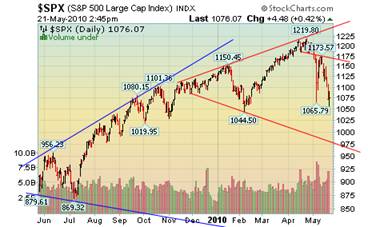 --A weeklong rout in stocks deepened, with U.S. benchmark indexes losing the most in more than a year. A look at the S&P 500 Index shows a deeper low has just been made, which confirms the decline as bearish and indicated there is more to go. You may wish to visit our YouTube Channel to get the latest technical information on our expectations for this decline. In the Words of Richard Russell, “Get out of stocks now…”
--A weeklong rout in stocks deepened, with U.S. benchmark indexes losing the most in more than a year. A look at the S&P 500 Index shows a deeper low has just been made, which confirms the decline as bearish and indicated there is more to go. You may wish to visit our YouTube Channel to get the latest technical information on our expectations for this decline. In the Words of Richard Russell, “Get out of stocks now…”
Treasury bonds make new highs as investors flee to safety.
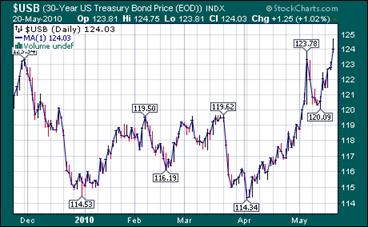 -- Treasury bonds are making new highs as investors seek to find a place of shelter in the financial storm. This rally may not last, but appears likely continue as long as there is a perceived risk in the stock market. The long bond is not a permanent resting place for investor cash, as the target for $USB may be near 130.00. Once the target is reached, the uptrend may be over.
-- Treasury bonds are making new highs as investors seek to find a place of shelter in the financial storm. This rally may not last, but appears likely continue as long as there is a perceived risk in the stock market. The long bond is not a permanent resting place for investor cash, as the target for $USB may be near 130.00. Once the target is reached, the uptrend may be over.
Is gold is reversing course.
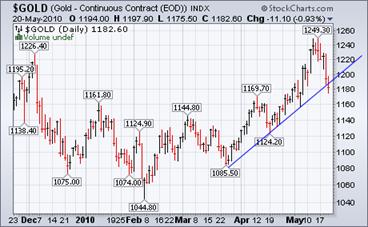 -- Gold reversed course this week and has broken its uptrend. The precious metal reached an all-time high of $1,249.70 an ounce in New York, last week. In last week’s Digest I had indicated that the relative strength index for gold futures neared 70, a signal that prices might be ready to decline. That observation was more accurate than I realized at the time.
-- Gold reversed course this week and has broken its uptrend. The precious metal reached an all-time high of $1,249.70 an ounce in New York, last week. In last week’s Digest I had indicated that the relative strength index for gold futures neared 70, a signal that prices might be ready to decline. That observation was more accurate than I realized at the time.
Nikkei may be approaching crash levels.
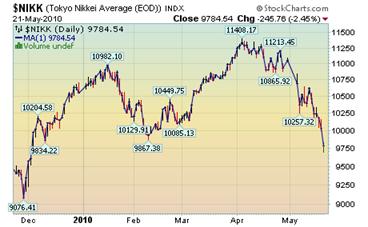 -- Japanese stocks fell, dragging key indexes to their biggest weekly drops in more than a year, as rising U.S. unemployment and a deepening split in Europe spurred concern the global economic recovery will stall. The Nikkei 225 Stock Average fell 2.5 percent to 9,784.54 in Tokyo, its lowest close this year. The Nikkei is now fallen below its prior low close in February. The next possible support level is 9000.
-- Japanese stocks fell, dragging key indexes to their biggest weekly drops in more than a year, as rising U.S. unemployment and a deepening split in Europe spurred concern the global economic recovery will stall. The Nikkei 225 Stock Average fell 2.5 percent to 9,784.54 in Tokyo, its lowest close this year. The Nikkei is now fallen below its prior low close in February. The next possible support level is 9000.
China stocks are down over 20%.
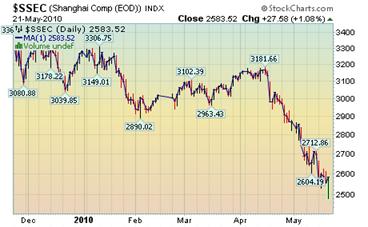 -- The Shanghai Composite Index rose 7.74, or 0.3 percent, to 2,563.68 at 1:20 p.m. local time, reversing a 2.9 percent decline. Today’s gains, however, are not enough to change the trend. It is more likely that the Shanghai Index may continue its slide. Although investors may be nibbling at the lows, it is not certain that the bottom is in.
-- The Shanghai Composite Index rose 7.74, or 0.3 percent, to 2,563.68 at 1:20 p.m. local time, reversing a 2.9 percent decline. Today’s gains, however, are not enough to change the trend. It is more likely that the Shanghai Index may continue its slide. Although investors may be nibbling at the lows, it is not certain that the bottom is in.
The dollar is holding up very well.
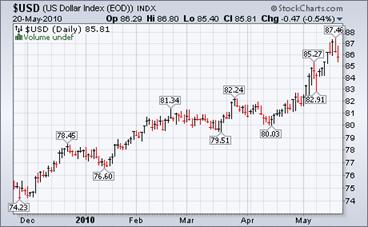 -- Tim Geithner keeps talking up a strong dollar, but that is only part of his job description. The fact is, many economists are starting to worry that the dollar is too strong, and exports may suffer. This doesn’t take into account the declining Euro, for example, which may ultimately put European manufacturers in the drivers seat.
-- Tim Geithner keeps talking up a strong dollar, but that is only part of his job description. The fact is, many economists are starting to worry that the dollar is too strong, and exports may suffer. This doesn’t take into account the declining Euro, for example, which may ultimately put European manufacturers in the drivers seat.
In the meantime, the dollar is still considered the “safe currency” in troubled times.
One in Ten Mortgage Borrowers Will Lose Their Home To The Bank.
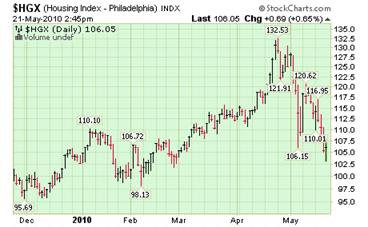 New Observations is forecasting that a minimum of one in ten homes with a mortgage today will be lost to foreclosure in the next two years and that this loss represents a staggering five-million-unit addition to inventory-for-sale. A record high 4.63% of mortgages were in foreclosure at the end of March The Mortgage Bankers Association reported Wednesday. Much worse, a mammoth 9.54% of mortgages are 90-days or more past due.
New Observations is forecasting that a minimum of one in ten homes with a mortgage today will be lost to foreclosure in the next two years and that this loss represents a staggering five-million-unit addition to inventory-for-sale. A record high 4.63% of mortgages were in foreclosure at the end of March The Mortgage Bankers Association reported Wednesday. Much worse, a mammoth 9.54% of mortgages are 90-days or more past due.
Deepwater Horeizon is a cause for concern.
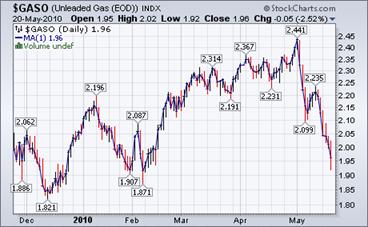 The Energy Information Agency weekly report observes, “On April 20, 2010, an explosion and fire occurred on the offshore drilling rig Deepwater Horizon, which had been drilling an exploratory well in approximately 5,000 feet of water in the Gulf of Mexico, 52 miles southeast of Venice, Louisiana. The platform subsequently sank with 11 crewmembers presumed dead, and an uncompleted well leaking oil into the Gulf of Mexico. While both public attention and current activities are now appropriately focused on efforts to contain the leak and to mitigate the resulting environmental damage, readers of this publication might also be wondering about potential effects on energy markets.”
The Energy Information Agency weekly report observes, “On April 20, 2010, an explosion and fire occurred on the offshore drilling rig Deepwater Horizon, which had been drilling an exploratory well in approximately 5,000 feet of water in the Gulf of Mexico, 52 miles southeast of Venice, Louisiana. The platform subsequently sank with 11 crewmembers presumed dead, and an uncompleted well leaking oil into the Gulf of Mexico. While both public attention and current activities are now appropriately focused on efforts to contain the leak and to mitigate the resulting environmental damage, readers of this publication might also be wondering about potential effects on energy markets.”
Natural Gas prices may have peaked.
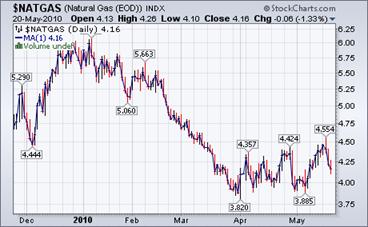 --. At most market locations, prices reached their high for the report week on Tuesday, when the Henry Hub price jumped to $4.42 per MMBtu before falling 14 cents the next day. Despite price increases, weather was generally mild across the country. Mean temperatures were in the 50s, 60s, and 70s in the majority of the lower 48 States, with some areas of colder weather in the 40s in Wyoming and Colorado.
--. At most market locations, prices reached their high for the report week on Tuesday, when the Henry Hub price jumped to $4.42 per MMBtu before falling 14 cents the next day. Despite price increases, weather was generally mild across the country. Mean temperatures were in the 50s, 60s, and 70s in the majority of the lower 48 States, with some areas of colder weather in the 40s in Wyoming and Colorado.
Albert Edwards: Europe Is On The Edge Of A Deflationary Precipice That Will, Paradoxically, Usher In 20-30% Inflation
From Soc Gen's Albert Edwards: The US and eurozone now stand on the edge of a deflationary precipice.
Amid all the recent euro-related turbulence, the markets have not focused enough attention on the rapidly vanishing core CPI inflation rates in the US and eurozone. With both moving below 1%, we are now only one cyclical mishap from joining Japan in outright deflation. Given our view that this cyclical recovery will end surprisingly early, slipping into the deflationary mire will trigger further, more extreme rounds of Central Bank monetisation, inevitably drivingus towards our ultimate destination – 1970’s style 20-30% inflation will surely return.
Exposing the Fed’s Racket.
(ZeroHedge) A reader provides us with the following letter he received from Senator Mikulski in response to dissatisfaction expressed about Bernanke's reconfirmation. The response from the Senator demonstrates precisely the type of intellectual racket that the Fed is exposing gullible and incompetent senators to, in forcing them to pass law after law that is only in the Fed's, and thus Wall Street's interests, as the alternative would always be a "market nose dive."
Traders alert: The Practical Investor is currently offering the daily Inner Circle Newsletter to new subscribers. Contact us at tpi@thepracticalinvestor.com for a free sample newsletter and subscription information.
Our Investment Advisor Registration is on the Web
We are in the process of updating our website at www.thepracticalinvestor.com to have more information on our services. Log on and click on Advisor Registration to get more details.
If you are a client or wish to become one, please make an appointment to discuss our investment strategies by calling Connie or Tony at (517) 699-1554, ext 10 or 11. Or e-mail us at tpi@thepracticalinvestor.com .
Anthony M. Cherniawski, President and CIO http://www.thepracticalinvestor.com
As a State Registered Investment Advisor, The Practical Investor (TPI) manages private client investment portfolios using a proprietary investment strategy created by Chief Investment Officer Tony Cherniawski. Throughout 2000-01, when many investors felt the pain of double digit market losses, TPI successfully navigated the choppy investment waters, creating a profit for our private investment clients. With a focus on preserving assets and capitalizing on opportunities, TPI clients benefited greatly from the TPI strategies, allowing them to stay on track with their life goals
Disclaimer: The content in this article is written for educational and informational purposes only. There is no offer or recommendation to buy or sell any security and no information contained here should be interpreted or construed as investment advice. Do you own due diligence as the information in this article is the opinion of Anthony M. Cherniawski and subject to change without notice.
Anthony M. Cherniawski Archive |
© 2005-2022 http://www.MarketOracle.co.uk - The Market Oracle is a FREE Daily Financial Markets Analysis & Forecasting online publication.



